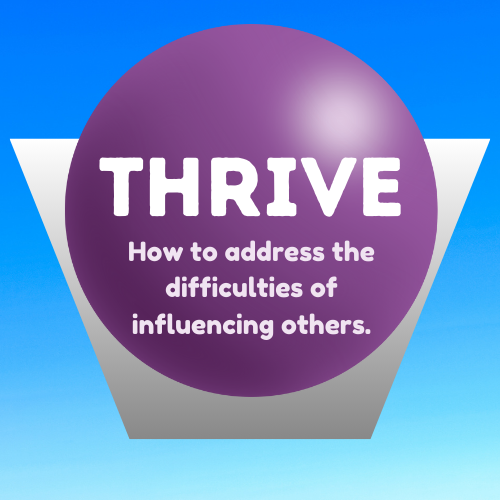THRIVE - How to address the difficulties of influencing others.
Are you influential at work and if not why not?
In this article readers will gain some actionable insights into how to become more influential with colleagues by better understanding their use of Emotional Intelligence.
What is your reaction to the question above?
If the answer is ‘Yes’ then this article may not be for you. If you answered either by saying something like ‘No!’ or ‘Not sure!’ then keep reading, this article is definitely for you.
By reading this article I hope that you will gain some actionable insights into how to become more influential at work simply by working on your Emotional Intelligence.
Emotional Intelligence
The Main Components.
“Emotional intelligence is critical in building and maintaining relationships and influencing others — key skills that help people throughout their career and wherever they sit in an organizational structure.”
I really like this quote from Harvard academic, Margaret Andrews. It is common sense that if we do not mindfully use emotional intelligence we are unlikely to form effective working relationships with colleagues. Equally if we do not use emotional intelligence skilfully, how can we expect to win colleagues over to our point of view or bring about win win outcomes. If we fail to connect with people then how can we influence them?
They key components of Emotional Intelligence are:
Self-awareness,
Self Regulation
Empathy,
Motivation,
Social Skills
To a greater or lesser extent we will already be using these skills automatically, what I am promoting throughout all my articles on THRIVE is the skilful use of Emotional Intelligence as a way of boosting positive career outcomes.
The benefits of the above in the context of influencing others are reasonably self explanatory but let me explain from where I see it…
If we are more aware of what we are feeling in any given interaction with others, we are more likely to be able to control (regulate) our response. If we are also able to connect with the emotions of others (empathy) we can also use that ‘information’ to help us to respond in a way that brings about influence. Behind all of this is our motivation, the why, behind the interaction. Keeping sight of that whilst also managing ourselves is essential for getting to where we need to be. In terms of social skills, for me the question is ‘What do I need to do socially to be able to be in a position to connect with others? What social skills do I need to work on in order to build that connection?
Common difficulties
in influencing others.
Here are some common difficulties that we could experience when trying to influence others.
Negative self-beliefs,
Setting out with a belief that no one is going to listen to you anyway, or that a particular person isn’t interested.
Essentially any thoughts about yourself that brings about a sense of fear that causes you to then not engage e.g “What can I contribute, I don’t have enough experience…!”
Fear of judgement that comes from poor self-esteem rather than that of poor psychological safety in the workplace.
Social anxiety,
Being with people may feel overwhelming especially if you then have to argue your point in meetings with all the focus on you.
Self-sabotaging thoughts about how you are perceived by others causing anxiety.
Finding oneself avoiding social interaction or avoiding contributing to discussions.
Impulsivity in what we say,
Over contributing / sharing as a result of feeling nervous,
Saying what’s on our mind before considering the potential impact of what we want to say on others,
Saying something from a place of insecurity rather than saying something that is said from a place of consideration and knowing the purpose of why we are saying it.
Missing social cues,
Sometimes one can repeat the thing that one wants the others to hear but they are simply not listening and as such we are having little impact and expending too much energy.
The body language of the recipient simply means that we should address the ‘thing’ at another time, but we try to push through anyway.
If any of these difficulties resonate with you, then do consider working on your use of Emotional Intelligence. There are plenty of online resources available and do keep an eye on the articles that I am writing (don’t miss anything and get extra benefits by subscribing to THRIVE).
A great way of developing one’s Emotional Intelligence skills is to work with a professional who is trained to help you to grow your emotional wellbeing (Hint - I can do this 😉 - Click here to ask!)
Keep checking in with these articles for ways to improve your own career boosting emotional intelligence or become a subscriber and be eligible for some useful benefits.
What you will gain from subscribing.
You will be the first to know about resources and information that you can utilise to enhance your career boosting emotional intelligence.
You will be eligible for community exclusive discounts on webinars, workshops and THRIVE 1-2-1 Coaching Sessions.
Free email support for any questions that you might have about developing your own career boosting emotional intelligence.
About John Hicks.
Since 2012, after a career in science and technology starting as a bench chemist then moving into sales and marketing and ultimately senior management, I decided to start my own company to help clients to see the truth in their abilities rather than fall for the deceitful thoughts that come with having a low self-esteem.
I realised that individuals at all levels of organisations can experience overwhelm, self-doubt and be de-railed by their automatic reactions to problems rather than have choice and control in bringing about the best outcomes.
If you want to find out more about my work then feel free to look around my website by clicking here.




